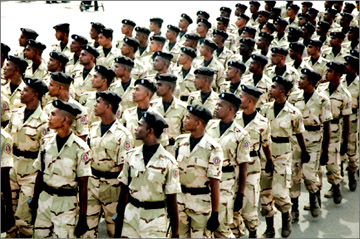Home Guards - the pulse of the village
Ramani Kangaraarachchi
 |
|

Troops of CSD at Independence Parade 2007 |
A potent force: During the 1980s, LTTE terrorists carried out massive
attacks on several threatened villages and brutally killed a large
number of innocent civilians including children, women and Buddhist
monks.
Attacks on Kebithigollawa, Dollar Farm, Kent Farm and Arantalawa come
to our minds. The Home Guard Force was established in 1985 to protect
these villages and counter the attacks.
After the CFA was signed the importance of Home Guards declined and
there was a tendency to use them for other purposes apart from guarding
villages.
After June 2006 when these attacks increased again, President Mahinda
Rajapaksa decided to re-organise and strengthen the Home Guard Force
using their valuable experience after giving them a proper training.
Rear Admiral Sarath Weerasekara, former Chief of Staff of the Sri
Lanka Navy was handpicked by President Rajapaksa and was appointed
Director General of Civil Security Department. Rear Admiral Weerasekara,
under whose command the CSD has become a very strong force making
remarkable progress, was interviewed by the Daily News of his success
story.
The members of the Civil Security Department presented a splendid
display at the Independence Parade this year. They were as good as any
other regiment and were greatly appreciated.
"The first thing I did was to go through the strength of the Home
Guards and their deployments. After a thorough study of Army and Police
deployment in a number of threatened villages, I found that personnel
were required to protect these villages to face any threat," he said.
They recruited about 5,000 people from all districts and gave them
training for two weeks on basic weapons handling and field craft. "We
did three such recruitment drives and increased the strength to 35,000
from the initial 19,000 which includes 2,000 women," Weerasekara said.
According to him the response had been very encouraging during the
recruitment.
The training needs were identified and they were given specialised
training and refresher courses as required at various training centres.
Initially, men and women living in these villages volunteered to
serve the Home Guard Force. They did it purely on a voluntary basis
without any pay or uniform. Not only did they have to use only shot guns
and batons as their weapons but also a large number of them had to
sacrifice their lives. However, it gradually became an organised force
under the command of the Police.
Today they are deployed in all the threatened villages and are
prepared to combat terrorism ensuring the protection and safety of the
villagers. Some of them are also guarding places of vital interest in
Colombo. A new uniform and a daily payment was also introduced to enable
them to perform their duties as a dignified force.
"Several changes in deployment have been done strategically on the
Army's advice because they know the type of threats and the direction
they come from."
"They homeguards are the best people to protect their own villages
because they know everything about the village and they will not migrate
if they have the basic needs. Our mandate is to protect villagers and
ensure that the people do not migrate [to cities]. Therefore I want to
give them a dignified life style," he said.
But Admiral Weerasekara has realised that it is not only due to the
LTTE threat that they tend to migrate but also due to social and
economic issues such as the non-availability of transport, a market to
sell their agricultural products, services of doctors, teachers and
infrastructure facilities.
He points out that arrangements are being made to solve these
problems and the "Jathika Saviya" programme is greatly helping in this
situation.
The CSD also in a small way have been able to appoint qualified women
members to teach in pre-schools and sell agricultural products to Army
camps.
With these facilities the number of villagers migrating to other
areas has reduced to a certain extent already and Admiral Weerasekara is
hopeful of better times ahead for the service. |

